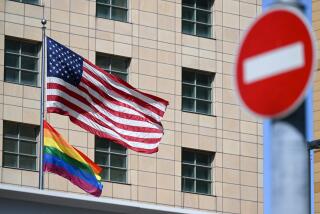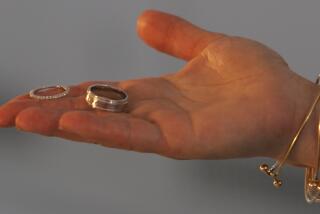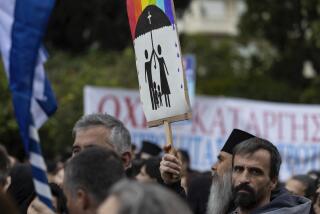New York Legislature passes gay marriage bill
With the forceful backing of a newly elected Democratic governor, the New York State Legislature gave final approval late Friday to a bill permitting same-sex marriage, enabling gay couples to head for the altar in late July.
After a sometimes emotional hourlong debate, the 62-member, Republican-controlled Senate approved the measure, 33 to 29. Earlier in the evening, the Democratic-led Assembly had amended its version of the bill to match the Senate’s, which carried additional exemptions for religious organizations that do not want to acknowledge or extend benefits to gays who marry.
Gov. Andrew Cuomo, who made the issue a centerpiece of his election campaign last year, signed the bill just before midnight. It will take effect in 30 days, making New York the sixth state, and the most populous by far, to permit same-sex marriage.
Interactive: Track gay marriage rights in the U.S.
“What this state did today brings marriage equality to a new plane,” Cuomo told reporters. “We reached a new level of social justice.” Outside the Senate chamber, many opponents sat on the floor and prayed aloud for the state.
The decisive votes were cast by two Republicans, veteran Sen. Stephen Saland of Poughkeepsie and Marc Grisanti, a freshman from Buffalo.
“I cannot legally come up with an argument against same-sex marriage,” Grisanti, a lawyer, said during the debate. “I cannot deny a person, a human being ... the same rights I have with my wife.”
Said Saland: “I have defined doing the right thing as treating all persons with equality.”
Democratic Sen. Thomas Duane, the first openly gay member of the Senate, spoke tearfully of his own experience and of his partner of many years. “Marriage strengthens families,” he said. “It will strengthen mine and it will strengthen all New York families.”
He ended his speech by offering respect to his opponents: “There are no villains in the chamber.”
About 150 miles from the Capitol in Albany, supporters erupted in cheers in the streets of Manhattan’s Greenwich Village. Around the Stonewall Inn, where a riot erupted 42 years ago Tuesday that many consider the start of the gay rights movement, couples whooped with joy, cried, embraced and proposed.
In neighborhoods with large gay populations, from Park Slope in Brooklyn to Jackson Heights in Queens, there was elation.
In California, patrons at Trunks, a West Hollywood gay bar, watched live coverage of the proceedings. West Hollywood resident Timothy McConnell, 45, said the New York law will “give gay marriage a big push across the nation.”
Snacking at a yogurt shop’s outdoor tables, West Hollywood resident Ray Montoya, 49, said he was among a generation of gay men who grew up facing discrimination and never imagined at first that gay marriage would be possible. “I’m getting the chills,” he said, describing his feelings after the New York vote.
In recent days the measure was the subject of intense, closed-door politicking between Cuomo and Republican leaders, who argued that it would put religious groups under pressure to endorse actions that violate their beliefs.
In the Capitol’s high-ceilinged, marbled hallways, a public debate on morality went on day and night, with supporters waving placards declaring gays’ right to marry and conservatives and ministers praying for the bill to fail. Late Friday, as senators gave floor speeches about rent regulations, a group of ministers chanted, “Amen, amen, amen, vote God’s way,” while advocates sang, “Vote yes!”
Both sides spent months lobbying and campaigning. Influential gay rights groups from New York and Washington banded together — setting up phone banks and spending $2 million on television advertising, hoping that a New York victory would jump-start a movement that has stalled in recent years.
“We are beginning to see the dark walls of discrimination crumble,” said Chad Griffin, cofounder of the group that is challenging Proposition 8, the California amendment banning same-sex marriage. “We started feeling the tremors with the unconstitutional ruling of Prop. 8 in California, then followed by the dismantling of ‘don’t ask, don’t tell’ and the unconstitutional finding of [the federal Defense of Marriage Act] and now the tremendous bipartisan victory for marriage equality in New York.”
New York’s Catholic bishops expressed disappointment.
“We always treat our homosexual brothers and sisters with respect, dignity and love. But we just as strongly affirm that marriage is the joining of one man and one woman,” the New York State Catholic Conference said in a statement posted on its website Friday night.
Other opponents cautioned against making too much of a bill that barely made it through the Legislature of one of the nation’s most progressive states.
Brian Brown, president of the National Organization for Marriage, vowed that in conjunction with the state’s Conservative Party, his group would spend more than $1 million to ensure that lawmakers who supported gay marriage would be defeated in the next election.
“All [the vote] means is that Gov. Cuomo was able to strong-arm and push through, because of the weakness of some Republicans, a gay marriage bill,” Brown said. “It doesn’t go away, and we’re going to make sure the people are held accountable.”
Although four New England states, Iowa and the District of Columbia have legalized gay marriage over the last decade, 30 states have approved constitutional amendments to ban it. The California Supreme Court approved gay marriage in 2008, but six months later, after 18,000 couples were married, voters passed Proposition 8 to overturn it. Proposition 8 is being challenged in federal court.
The crucial Senate vote came one day after President Obama spoke at a gay rights fundraiser in New York. He drew applause when he said gay couples deserved “the same legal rights as any other couple,” but he stopped short of endorsing the gay marriage legislation.
Daniel O’Donnell, the first openly gay member of the New York State Assembly, first introduced a same-sex marriage bill in 2007. The Assembly approved it three times, but it failed in the Senate each time — even in 2009, when the governor’s mansion, the Assembly and Senate were all briefly controlled by Democrats.
But O’Donnell’s fourth attempt, backed by Cuomo, finally succeeded.
For many Republican senators, a sticking point was in the language of the original Assembly bill scripted by Cuomo, which exempted religious institutions and private benevolent organizations from having to recognize gay ceremonies.
The Republicans said it did not go far enough to protect faith-based providers of adoption, foster care and marital counseling that receive government funds from being sued by gay couples demanding to use their services.
Cuomo and gay rights advocates argued that the state’s Human Rights Law ensured religious groups’ freedom. Some influential Senate Republicans, however, met privately with the governor to bolster those protections, and the final bill included their negotiated changes.
Cuomo pushed to see the legislation passed in time for this year’s Gay Pride weekend, which includes a parade Sunday down Fifth Avenue in New York.
The theme this year is “Proud and Powerful.”
Interactive: Track gay marriage rights in the U.S.
Times staff writer Ricardo Lopez in West Hollywood contributed to this report.
More to Read
Start your day right
Sign up for Essential California for news, features and recommendations from the L.A. Times and beyond in your inbox six days a week.
You may occasionally receive promotional content from the Los Angeles Times.






